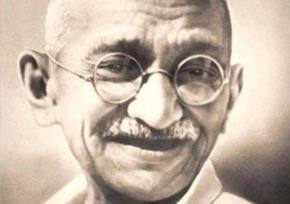Remembering the Mahatma

Gandhiji was born today 140 years ago. The ideals of the man regarded as the father of the nation, an apostle of non violence and compassion and as one of the greatest men to have walked the earth are remembered to this day throughout the world – though more in letter than in spirit; especially in India, where it has been reduced to lip service by politicians of all stripes.
Why has this been the case? The present generation of intellectuals has the advantage of both hindsight and the body of knowledge and analyses collected and ruminated over the decades since his passing to come up with insights why Gandhian ideals are so impossible to adopt for nations.
The passage of time has brought greater scrutiny on the Mahatma’s actions in his time and there is a growing body of intellectuals that today questions whether his pacifism and uncompromising adherence to the principle of turning the other cheek caused the country more harm than good. More people than ever before question the practicality of such a line of thought in matters of nationalism, politics and statecraft.
A dissenting voice to Gandhism had always been there; it was indeed that voice that drove one man to extreme action on the fateful afternoon of January 30, 1948. In a forthcoming issue, we will run a piece on the new prism through which an increasing number of Indian nationalists are beginning to view Gandhism.
None of this, however, takes anything away from the greatness of the man and his capacity to motivate and mobilise millions of people with his simple words and actions. No matter what anybody might think about the practicality of his political philosophy, there is simply no denying the fact that he was indeed one of the greatest men who ever walked the planet.
Gandhiji was born today 140 years ago. The ideals of the man regarded as the father of the nation, an apostle of non violence and compassion and as one of the greatest men to have walked the earth are remembered to this day throughout the world – though more in letter than in spirit; especially in...
Gandhiji was born today 140 years ago. The ideals of the man regarded as the father of the nation, an apostle of non violence and compassion and as one of the greatest men to have walked the earth are remembered to this day throughout the world – though more in letter than in spirit; especially in India, where it has been reduced to lip service by politicians of all stripes.
Why has this been the case? The present generation of intellectuals has the advantage of both hindsight and the body of knowledge and analyses collected and ruminated over the decades since his passing to come up with insights why Gandhian ideals are so impossible to adopt for nations.
The passage of time has brought greater scrutiny on the Mahatma’s actions in his time and there is a growing body of intellectuals that today questions whether his pacifism and uncompromising adherence to the principle of turning the other cheek caused the country more harm than good. More people than ever before question the practicality of such a line of thought in matters of nationalism, politics and statecraft.
A dissenting voice to Gandhism had always been there; it was indeed that voice that drove one man to extreme action on the fateful afternoon of January 30, 1948. In a forthcoming issue, we will run a piece on the new prism through which an increasing number of Indian nationalists are beginning to view Gandhism.
None of this, however, takes anything away from the greatness of the man and his capacity to motivate and mobilise millions of people with his simple words and actions. No matter what anybody might think about the practicality of his political philosophy, there is simply no denying the fact that he was indeed one of the greatest men who ever walked the planet.









Leave a Comment